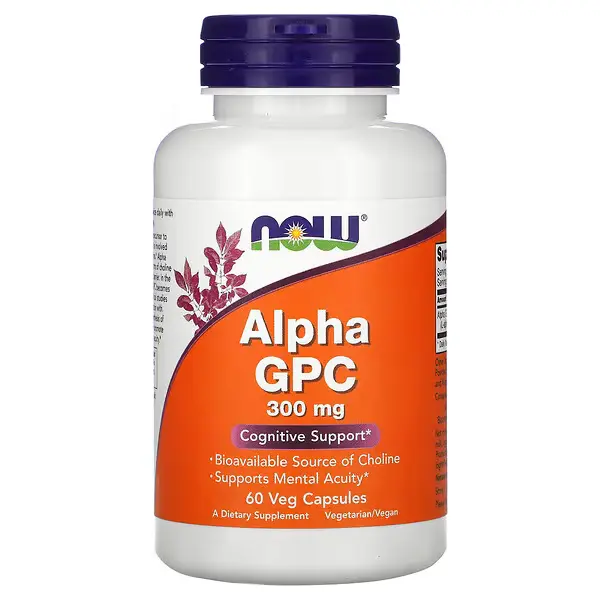Alpha-GPC
What is alpha-GPC?
Alpha-glycerophosphocholine is a compound naturally occurring in the brain and (in trace amounts) various foods. It is famous for being an efficient choline prodrug.[2] Choline is an essential nutrient,[1] meaning it needs to be obtained from the diet since the body is not capable of producing it or producing it in sufficient quantities.[3] Choline has multiple roles in the human body, among others it makes up part of our cell membranes and is required to produce the neurotransmitter acetylcholine.
Where does alpha-GPC come from?
Alpha-GPC is produced naturally by several animals, humans included. It is also produced synthetically to be used for oral supplementation. Acetylcholine is used by bacteria, fungi, and various animals which is a testament to its versatility. Acetylcholine was first noted by Adolf von Baeyer in 1867 who named it acetylneurin.[7] Later, in 1921 the concept of neurotransmitters came to light and by 1926 Otto Loewi had deduced acetylcholine could be categorized as such.[8] Ten years later, in 1936 he and H. H. Dale were awarded the Nobel Prize for their work on acetylcholine and nerve impulses. [9]
What are the effects of alpha-GPC?
Alpha-GPC works mainly by giving the body a source of choline from which it can synthesize acetylcholine. It therefore works primarily by increasing the concentration of the neurotransmitter acetylcholine in the body and brain. Acetylcholine is a neurotransmitter involved in the activation of muscles. It also plays a role in the autonomic- and the sympathetic nervous system[4] and it is the primary transmitter of the parasympathetic nervous system.[5] Furthermore acetylcholine plays a role in the parts of the brain responsible for, amongst others, arousal, attention, memory and motivation.[6] All of its purported benefits can be ascribed to it versatile role in our nervous system
Cognitive
- Increased wakefulness
- Improved concentration
- Improved motivation
- Improved memory
- Reduced cognitive decline
Physical
- Increased power output
- Increased endurance
How to use alpha-GPC?
Although alpha-GPC is available in food, the amounts in which are nowhere near the preferable dose. Therefore it is best supplemented in a standard pill form. Pills containing alpha-GPC are available in most countries as a legal dietary supplement.
How much alpha-GPC to use?
When trying out new supplements it is wise to start with a lower dose and–depending on the experienced effects–increase or decrease the dosage accordingly
Most of the available pills range from 300 to 600 mg in the amount of alpha-GPC they contain. Studies on countering the cognitive decline of alzheimers or a recent stroke used a daily dose of 1000 mg for 28 days.[10] Studies testing the change in physical performance of athletes used a dose of 600 mg prior to exercising.[11] A boost in physical performance might be best achieved by taking a single ‘higher’ dose to create a peak in the amount of acetylcholine available during exercise. For the cognitive benefits of alpha-GPC it may be best to take a ‘lower’ dose multiple times per day to maintain increased levels of acetylcholine.
What are the side effects of alpha-GPC?
There are no known serious side effects of alpha-GPC. A small number of users may experience a mild headache or teeth grinding. Taking alpha-GPC might exacerbate the symptoms of trimethylaminuria (also known as fish odor syndrome) in people suffering from it.
Interactions of alpha-GPC
Most nootropics are relatively safe to use on their own. Combining them with other substances may cause them to suddenly become dangerous or life-threatening.
alpha-GPC possible interactions with MAOIs which could be dangerous. Combining alpha-GPC with prescription MAOIs should be avoided.[12]
References
- [1] Rucker, R. B., Zempleni, J., Suttie, J. W., & McCormick, D. B. (2007). Handbook of Vitamins, Fourth Edition. Taylor & Francis.
- [2] Parnetti, L., Mignini, F., Tomassoni, D., Traini, E., & Amenta, F. (2007). Cholinergic precursors in the treatment of cognitive impairment of vascular origin: Ineffective approaches or need for re-evaluation? Journal of the Neurological Sciences, 257(1–2), 264–269. https://doi.org/10.1016/j.jns.2007.01.043
- [3] Vaughan, J., & Geissler, C. (2009). The New Oxford Book of Food Plants. Oxford University Press.
- [4] Tiwari, P., Dwivedi, S., Singh, M. P., Mishra, R., & Chandy, A. (2013). Basic and modern concepts on cholinergic receptor: A review. Asian Pacific Journal of Tropical Disease, 3(5), 413–420. https://doi.org/10.1016/s2222-1808(13)60094-8
- [5] Lott EL, Jones EB. Cholinergic Toxicity. 2021 Jun 29. In: StatPearls [Internet]. Treasure Island (FL): StatPearls Publishing; 2021 Jan–. PMID: 30969605.
- [6] Kapalka, G. M. (2010). Substances Involved in Neurotransmission. Nutritional and Herbal Therapies for Children and Adolescents, 71–99. https://doi.org/10.1016/b978-0-12-374927-7.00004-2
- [7] Baeyer, A. (1867). I. Ueber das Neurin. Annalen Der Chemie Und Pharmacie, 142(3), 322–326. https://doi.org/10.1002/jlac.18671420311
- [8] Loewi, O. (1922). Über humorale Übertragbarkeit der Herznervenwirkung. Pflügers Archiv Für Die Gesamte Physiologie Des Menschen Und Der Tiere, 193(1), 201–213. https://doi.org/10.1007/bf02331588
- [9] Kawashima, K., Fujii, T., Moriwaki, Y., Misawa, H., & Horiguchi, K. (2015). Non-neuronal cholinergic system in regulation of immune function with a focus on α7 nAChRs. International Immunopharmacology, 29(1), 127–134. https://doi.org/10.1016/j.intimp.2015.04.015
- [10] Traini, E., Bramanti, V., & Amenta, F. (2013). Choline Alphoscerate (Alpha-Glyceryl-Phosphoryl-Choline) An Old Choline- containing Phospholipid with a Still Interesting Profile As Cognition Enhancing Agent. Current Alzheimer Research, 10(10), 1070–1079. https://doi.org/10.2174/15672050113106660173
- [11] Ziegenfuss, T., Landis, J., & Hofheins, J. (2008). Acute supplementation with alpha-glycerylphosphorylcholine augments growth hormone response to, and peak force production during, resistance exercise. Journal of the International Society of Sports Nutrition, 5(S1). https://doi.org/10.1186/1550-2783-5-s1-p15
- [12] Khosrow Tayebati, S., Tomassoni, D., Ejike Nwankwo, I., di Stefano, A., Sozio, P., Serafina Cerasa, L., & Amenta, F. (2013). Modulation of Monoaminergic Transporters by Choline-Containing Phospholipids in Rat Brain. CNS & Neurological Disorders - Drug Targets, 12(1), 94–103. https://doi.org/10.2174/1871527311312010015
| Name | Alpha-GPC |
| Effects | Focus, Memory |
| Consumption | Daily Alpha-GPC should be consumed on a daily basis to reap the most benefits. |
| Dosage | 200 ~ 500 mg Low to medium dosage 200 500 1000 |

